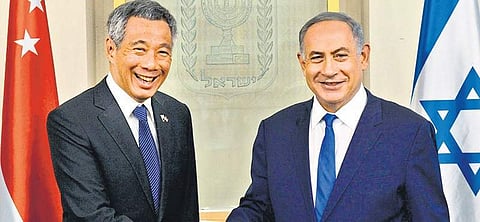

One is in the east and the other in the west, but visiting both Singapore and Israel remains a learning for anyone who looks at strategic issues with focus. Both are small nations, good friends of India, and punch much above their weight; Singapore in the economic and governance domains, and Israel in the world of security and technology. Both will take exception to my limited choice of areas, in which I classify them for their proficiency. But I do so only due to constraints of space. I happened to be in the two nations back-to-back, and hence this piece is all about a few observations more from geopolitical and geostrategic angles. The two nations are high on India’s strategic graph.
I was in Singapore as a Distinguished Guest at the invitation of the government through the famous Rajaratnam School of International Studies (RSIS) under its national security studies programme. My curriculum included two main talks and a series of interactions dealing with strategic issues; it included access at very high government levels. This was my umpteenth visit to Singapore, which in recent years has emerged as the focal centre for strategic studies in Asia. While there was much that one took away from the outstanding interactions one had with vital players in the world of strategic affairs, there was much one could also contribute to the departments from a practitioner’s angle; the experience in practical handling of threats being comparatively limited among the experts there.
The biggest take away for application to India’s world of handling strategic security was the almost complete integration of academia, think tanks, security practitioners to include the armed forces and police, and interestingly the bureaucracy. The most outstanding knowledge management system seems to have been developed. There are extremely fresh domains which find sections within RSIS involved in their research—one such is ‘fake news’. There appears no silo system of knowledge management as one finds in India.
Singapore’s main security concern appears to be the potential of lone wolf attacks to upset the carefully-crafted syncretic model of existence. Being a developed society, the threat perception is live that such attacks could be carried out by regional or home-grown Islamic radicals intending to deliver a message of capability to target a developed state. Hence, there is tremendous urge to understand the issues related to Islamic radicalism.
Moving to Tel Aviv to attend the famous Herzliya World Summit on Counter Terrorism, I found myself there after long. The meet was a lesson in focus. While none can deny the existence of maximum threats from violent extremism in Middle East and now Europe, the quantum of attention to other regions was minuscule. For the first time in years, we had a workshop on Af-Pak, where an attempt was made to project the models of terrorism in South Asia. Despite the contextual nature of the theme, the level of interest was marginal even among the US experts. Israel’s advantage is that even the ministers who spoke at the plenary sessions had much experience in either the Israeli defence forces or police.
Pakistan got away squarely without being named for its nefarious activities, nor was there any reference to its role in the spread of radical Islam. In fact, in the plenary sessions you found no Indian, but Pakistani presence on the dais was more noticeable.
The private conversations among delegates revolved around Israel’s apparent obsession with Iran, and the returning confidence Israel has in the US after the Obama administration’s departure. A most interesting theme dwelt on the inevitability of a clash between Israel and Hizbullah, especially focusing on the arsenal of rockets built up by the latter. Although Israel has its own iron dome system, the challenge to defend itself against thousands of rockets rained upon its facilities, and population centres does remain a nightmarish contingency.
There were interesting discussions on Europe, the future of IS, the resurgence of Al Qaeda and the immigration issue. The apparent lack of clarity on the future of Syria was glaring, but on IS there seemed consensus about its ability to disperse and conduct its activities. The financial networks and the importance of these in sustaining a movement such as IS did not emerge. Central Asia did not emerge as a possible option for IS, despite the knowledge that the narco-networks and abundance of gas could be possible temptations for the group to gravitate there. The Marawi standoff in the Philippines hardly found mention, proving that the conference was not comprehensive in outlook. In its Middle East orientation it was, of course, outstanding.
Like Singapore, Israel too has ensured full integration of its stakeholders with a networked human resource-based and data-linked knowledge bank. There are no silos of knowledge there either. That was the big takeaway for India, which needs to get its act together on knowledge management in a more professional way. The setting up of the National Defence University delayed by better part of 16 years now may need a push from none less than the PMO.
Lt Gen (retd) Syed Ata Hasnain
Former Commander, Srinagar-based 15 Corps
atahasnain@gmail.com